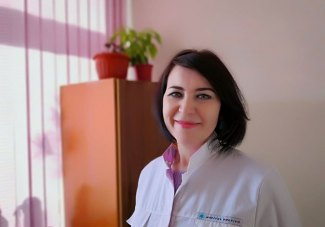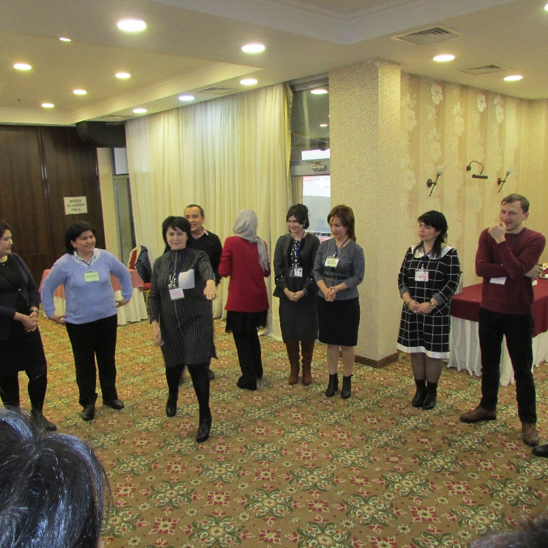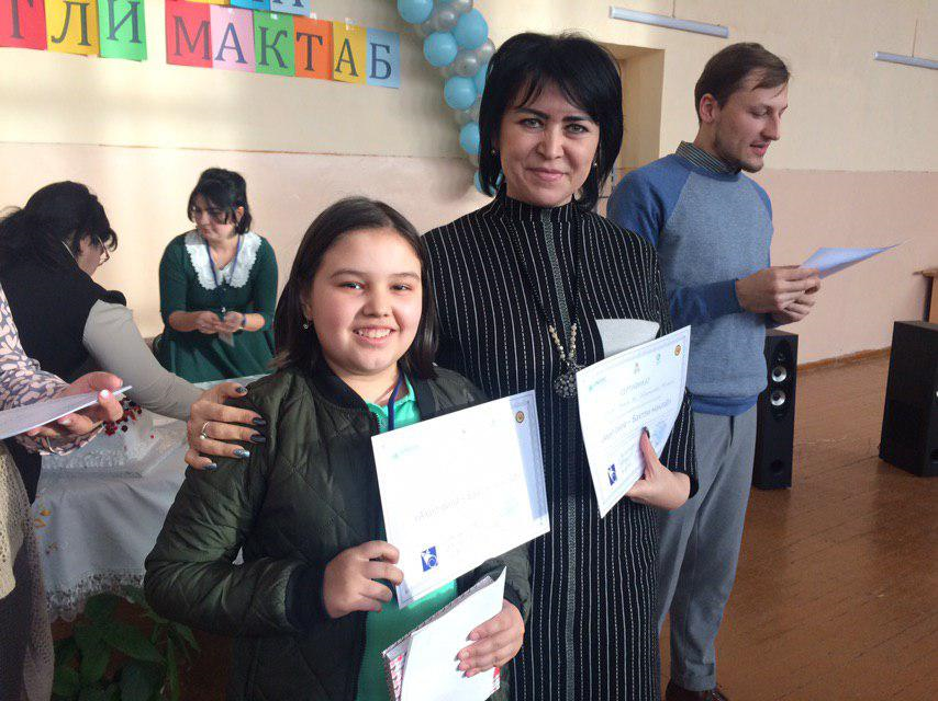Promoting and Broadening the Horizons of UNODC Drug Prevention Methodologies for Working with Adolescents, Youth and Families in Uzbekistan

Every morning, Dr. Lilia Muzaffarova walks to work at the Tashkent City Narcological Dispensary. During her walk regardless of the season, Lilia admires the beauty of nature, which she loves very much, and also gazes into the faces of passers-by, some - happy, some - sad and full of worries, which makes her mind wonder how many people she can help to find harmony in their families today. Dr. Muzaffarova is the Head of the adolescent department of the narcological dispensary, she works on diagnosis, treatment and prevention of drug addiction among youngsters and adolescents which makes her well-aware that any family, regardless of their financial status or education, can face the problem of addiction.
Since 2008, Dr. Muzaffarova has been regularly participating in UNODC workshops focusing on health-related responses. These workshops fall within the framework of Subprogramme 3 "Drug Dependence Prevention, Treatment and HIV Prevention" of the UNODC Programme for Central Asia2015-2021, as well as UNODC Global Projects GLOK01 “Prevention of drug use, HIV/AIDS and crime among young people through family skills training programmes in low- and middle-income countries” and GLOJ71 "Treating drug dependence and its health consequences: Treatnet II". Such workshops included training on programmes for the prevention of drug use among adolescents and young people through strengthening family relationships, as well as 14 courses of the Universal Treatment Curriculum for Substance Use Disorders (UTC) and successful application of the learned methods and skills, adapting them to different formats, audiences, expanding the coverage and achieving positive results. She also willingly teaches her colleagues the skills she has acquired through trainings.

An Unexpected Effect During a Pandemic
During a conversation, Dr. Muzaffarova told us more about her practice during the pandemic: "At the beginning of the spread of COVID-19, many patients experienced panic attacks, conflicts began in families due to an unusually long stay together, people felt confused, parents did not know how to interact with children, it was difficult for them to find time and energy to help children adapt to studying online, there was quite a lot of internal stress, mood disorders, depressive states, there were even suicidal tendencies".
As a national trainer for the Strengthening Families Programme (SFP 10-14) and the UNODC Strong Families Programme that teach family skills, positive parenting, communication skills, stress relief relaxation techniques, conflict detection and resolution, Lilia realized in time that the methods from drug prevention programmes work well in the new stressful situation caused by the pandemic, where everyone was forced to be in confined spaces. Adolescents demonstrated behavioral disorders, fathers experienced stress due to worries on feeding their families, not being able to leave the house, and mothers were torn between everyday life, work and children studying from home. Using online platforms available to clients: Zoom, WhatsApp, Telegram, and just audio messages, Dr. Muzaffarova adapted her work to the online mode. Since the start of the pandemic, Lilia has held various sessions for 1,470 teenagers and their families, according to her report. "The majority of my patients were parents who felt lost due to not knowing how to improve relationships with children, conduct explanatory work, how to be confident and build “the family shield”, be understanding to each other, feel united, and create a positive emotional environment". Dr. Muzaffarova highly appreciated UNODC-introduced new tools specifically related to caregiving and parenting under COVID-19.

"In March and April, probably the most stressful period, it was clearly visible that the parents who participated in the Strong Families programme were better able to cope with the situation, applying the acquired skills and asked facilitators of the programme to help their relatives and friends with the issues they were facing," says Lilia. "The peculiarity of adolescence is that at this time the worry about sick parents or depression from the loss of loved ones often manifests itself in behaviour disorder: depression in adolescents takes the shape of aggression, rebellion, withdrawal, and refusal to study. That was the time we all, including school psychologists, were forced to open the UNODC manuals and refresh our memory on the principles of differential diagnosis". An essential advantage of the UNODC programme, according to Dr. Muzaffarova, is its scientific validity, conciseness, efficiency, interactivity, and versatility, which makes it possible to expand the scope of its application.
Expanding Horizons
Dr. Muzaffarova has 10 years of teaching experience at the Department of Narcology, Adolescent Psychopathology and Psychotherapy of the Tashkent Institute for Advanced Medical Education. Based on her experience as an adolescent narcologist, Lilia highlights the importance of the methods promoted by the UNODC workshops, which make it possible to have broader perspective, understand the essence of the problem, develop effective methods and involve all family members, which is extremely important while working with adolescents. It should be emphasized that these methods are successfully adapted to different ages and the local context, especially in the year declared by the President of the Republic of Uzbekistan as the year of support to young people. The main goal of prevention is the development of a harmonious, happy personality, which requires a warm family environment.
"I also take part in work with representatives of the mahalla (community), young parents, as well as those who are planning to build a family, in which I include such elements as teaching family skills, conflict resolution skills, and also share information on the stages of personality development starting from birth and the ways parents can affect a child’s life. It helps me to achieve positive results upfront. People begin to think more about the responsibility of parenting, to reflect and work on mistakes".
Understanding family habits, the origin of stress and its consequences have proven to be effective even with young adults, such as university students. Due to strict discipline and environmental conditions, stress-creating factors can sometimes lead to substance use. Dr. Muzaffarova skillfully adapts the knowledge gained from the UNODC workshops, bringing it into the shape personalized for the target audience.
Dr. Muzaffarova also works part-time in a private clinic, where she also successfully integrates the studied approaches into the treatment practice.
In addition to her main work, Lilia is the head of the international charity society "Eastern Woman" ("Sharq Ayoli"), where she supervises the "Happy Family" project in her free time, in which she also uses elements from UNODC programmes.
Dr. Muzaffarova can be called an invisible hero and a champion in promoting UNODC evidence-based and cost-effective initiatives on drug addiction prevention and treatment in Uzbekistan.
A True Story
Once upon a time, there lived a teenager suffering from substance abuse, being in remission. However, the pandemic started, and due to the restrictions imposed, his father who at the time was in another country could not come back. The whole situation caused a relapse, but the teenager could not go to the treatment facility since the traffic in the city was strictly limited. Psychotherapy had to be carried out online with the teenager and his mother, helping her communicate with him in such a difficult period. It undoubtedly helped the adolescent avoid breaking down and wait for his father, who flew back home with the first chance. However, due to the stress experienced, the father experienced panic attacks, so he joined our sessions on building a "family shield", how to talk about his feelings, and how to enjoy life with the whole family. Family members wrote letters to each other, where they shared experiences that they could not tell directly. After the therapy was over, they initiated new father-son leisure activities that strengthened their bond - they began to learn a language together and made a habit of jogging. All the family skills taught by the programme helped them get out of the crisis, demonstrating that timely psychological assistance can not only help overcome the crisis, but also strengthen the family bonds.
Personal Experience
At some point in 2020, Dr. Muzaffarova also fell ill with COVID-19, and for health reasons, she was forced to spend three months at home, when she felt the need to apply the techniques from the UNODC courses in her own family. "It was a unique experience, and I could feel the effect first-hand".
Of course, my profession forced me to work online while on vacation, but it was then that I realized how my helping others helps myself. Programmes such as "Strong Families" and "Family UNited" that save, that change, that help - this is what inspires and grants me the energy to move on."